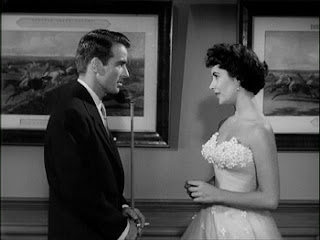Fritz Lang was a perpetually political filmmaker. The darkness of his worldview was evident in his most famous masterpieces, Metropolis, a dystopic vision of a future now behind us, and M, where a paedophile is reviled by a court of criminals. His films are frequently alive with the eponymous emotion of one of his finest works, 1936's Fury, where Spencer Tracy's innocent seeks revenge on the townspeople who tried to burn him alive. The bold black-and-white of these films seems to shine more definitely than most, crisply capturing some of the most vibrant interactions and discussions ever filmed. As much as there's a distinctive Lang style, there's a distinctive Lang mood to match it.
Fast-forward to 1956, though, and we find two Lang pictures that are less burning than smouldering. Beyond a Reasonable Doubt and While the City Sleeps - both headlined by noir favourite Dana Andrews - avoid the opinionated rage of Lang's earlier work for a more studied, intellectual disdain towards detailed political and social issues. Beyond A Reasonable Doubt very consciously lays itself out as an experimental game into the arena of social justice - Andrews' Tom Garrett schemes with his future father-in-law Austin Spencer (Sidney Blackmer) to prove the ineptitude of the district attorney and his reliance on circumstantial evidence. Carefully, they plant clues both physical and social - visiting the girls at the nightclub where a murdered dancer had been a performer - to lead to Tom's arrest. It entwines a highly schematic plot with Tom's romantic engagement with Susan (Joan Fontaine), and in doing so reveals itself to be founded on serious class issues.
Austin and Tom's game is of the superior snob proving his superiority over the working class police force, although my initial criticism that their fun little plot might be a little distracting for the genuine investigation comes a bit - alright, a lot unstuck with the film's sensationalist twist. The film is too keen on showing off its own brains - the dialogue is predominantly expositional, pre-empting questions that no one was asking yet. Joan Fontaine, awkwardly crunching her shoulders in flowery dresses, seems thrown in to guarantee our continued investment in Tom and his dangerous game. But her lingering presence also suggests the greater dramatic reverberations, which culminate in an inevitably fiery twist of fate from which the film abandons cool social criticism and heads down the path of consternated drama. The final twist not only gives Dana Andrews the cherished chance to gurn like a maniac, but it finalises a regretful negation of the intriguing social commentary which ran for the first half.
While the City Sleeps, the longer and more detailed of this 1956 pair, uses its patchwork of characters to create a more scholarly version of a Robert Altman film. Both films eschew any character identification by invading any space they damn well please, and While the City Sleeps even flaunts this omniscience with its dramatic opening sequence. The camera flirts with the killer's (John Drew Barrymore) point-of-view, and openly reveals his identity from his first knock on a doomed lady's door. (Intriguingly, after the influence of Psycho's bathroom murder I've been seeing lately in the openings of The Beast of Yucca Flats (warning: ludicrously wonderful) and Blood Feast (warning: gruesomely terrible effects), this opening sequence could almost be a precursor - a bathroom framed with a narrow doorway, and the scrawled message of 'Ask Mother' left behind!) Though the film's poster sells it as another sensationalist killer thriller, the film creates a deliberately placid narrative where the murderous exploits of the 'Lipstick Killer' are of as much interest as the machinations of a media corporation's internal competition for the post of executive director. Lang maximises the possibilities for deep compositions within the budget constraints and square 2:1 ratio, crafting a more fully realised set of complex spaces than the boxed studio feel of Beyond A Reasonable Doubt.
 |
| Deep space as Edward Mobley (Dana Andrews) appears at the rear |
Although their contest revolves around scoring a revelatory exclusive on the killer, Lang carefully entwines the escalating delirium of the killer with the sociosexual conflicts between the three competitors and their colleagues. The pointed comparisons between the working class killer and the middle-class media executives are obvious, matching their mistreatment and fetishisation of women through key image matching like the button locks on apartment doors (below). Lang even shows a crude blank face in one of the newspapers issued by the corporation (right), inviting the city readership to draw the face of the killer - the implication being that any of the characters on display could fill the spot given the wrong circumstances. Barrymore (Drew's father, whose career never took off) is less the hardened or creeping murderer type than a troubled teenager resembling Marlon Brando's Wild One.
 |
| Killer ≠ seducer |
None of its threads are ever fully realised, but While the City Sleeps plays with other ideas that didn't come into vogue until the following decade - the ruthless instincts newly manifest in females, the destructive relationship between media and the law. Though as a sealed off product While the City Sleeps looks minute and basic, it proves itself a key film in the Lang canon, a devastatingly pessimistic critique of American values. As a two-fer, Lang's final Hollywood films act a summary of his experiences in the country, a place he seemed to view as more intrinsically rotten than the homeland he fled during the rise of Nazis.


























